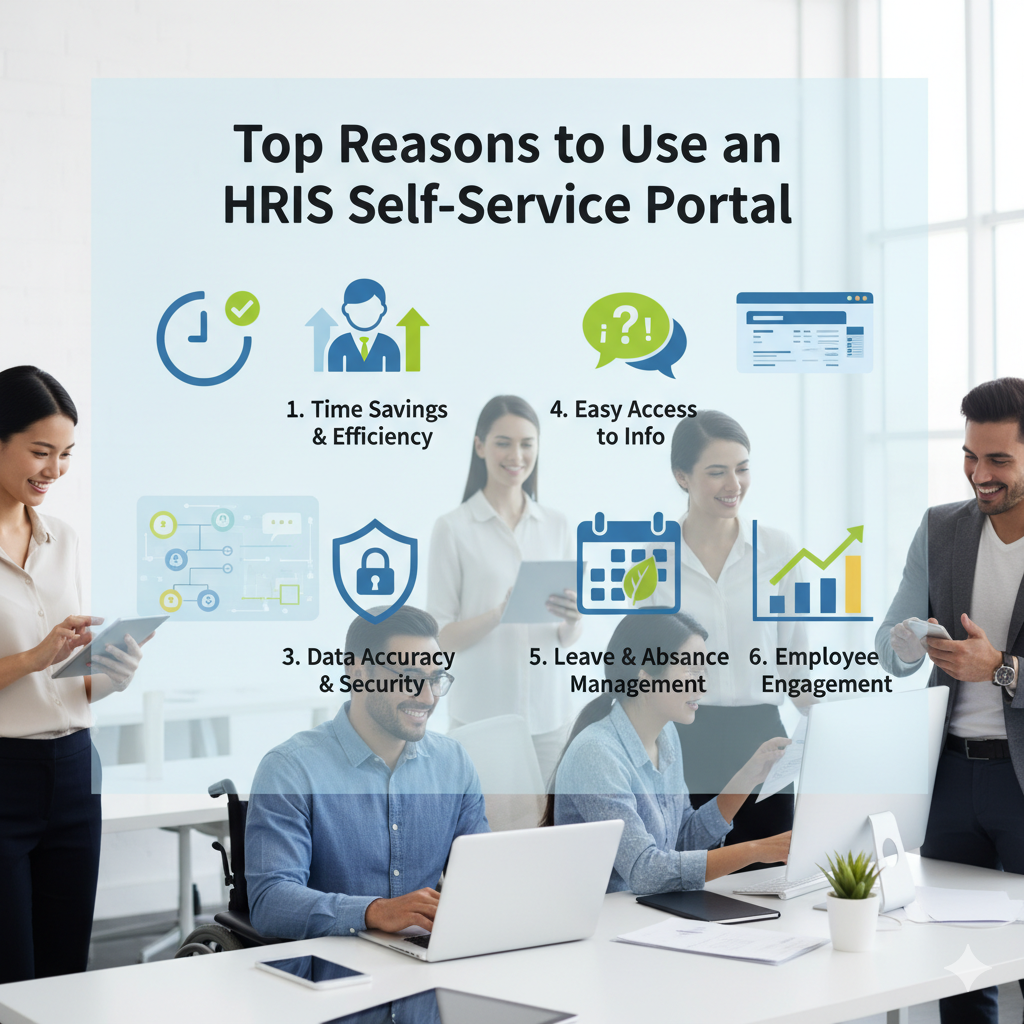Address
Kaypian, San Jose Del Monte City, Bulacan Philippines
Work Hours
Monday to Friday: 8AM - 6PM
Weekend: 10AM - 5PM
Address
Kaypian, San Jose Del Monte City, Bulacan Philippines
Work Hours
Monday to Friday: 8AM - 6PM
Weekend: 10AM - 5PM


Integrated HR. Accurate Payroll.


Integrated HR. Accurate Payroll.

In today’s fast-paced business world, organizations are constantly seeking ways to improve efficiency and empower their employees. One of the most effective tools to achieve both is an HRIS (Human Resource Information System) self-service portal.
An HRIS self-service portal allows employees to manage their personal information, benefits, attendance, leave requests, and more—without depending on HR staff. This not only saves time but also enhances transparency, accuracy, and engagement across the workforce.
In this article, we’ll explore the top reasons to implement an HRIS self-service portal and how it can revolutionize the way your organization handles HR operations.
Traditional HR processes often involve manual data entry, endless paperwork, and repetitive administrative tasks. An HRIS self-service portal automates these processes—reducing errors and freeing up valuable time for HR professionals to focus on strategic initiatives like talent management and employee development.
Key Benefits:
By digitizing HR tasks, companies can save hundreds of hours annually while improving overall efficiency.
Empowerment is key to employee satisfaction. When employees can independently access their information—such as payslips, leave balances, or performance reviews—they feel more in control of their careers.
With an employee self-service HR portal, employees no longer need to wait for HR to answer basic queries. This autonomy boosts trust and engagement within the organization.
Example:
Employees can log in anytime to update their contact details, view company policies, or submit requests—all from a single dashboard.
Manual HR management increases the risk of outdated or inaccurate employee information. An HRIS self-service system updates data in real time, ensuring both HR teams and employees always have access to the latest information.
Why It Matters:
Having accurate data readily available also helps managers identify trends in attendance, performance, or turnover more effectively.
An HRIS portal acts as a communication bridge between employees and HR. It provides a centralized hub for announcements, policy updates, and important resources—promoting transparency across all levels of the organization.
Top Features:
When employees feel informed and included, workplace morale naturally improves.
Implementing an HRIS self-service portal reduces administrative overhead and the need for repetitive HR interventions. Tasks that once took days can now be completed in minutes—saving both time and money.
ROI Example:
Organizations that automate HR processes can reduce HR-related costs by up to 30% annually while improving accuracy and compliance.
Modern HRIS platforms include robust data security features such as encryption, user authentication, and access controls. These features ensure sensitive employee data remains confidential and protected.
Additionally, automated systems simplify compliance with labor laws and data protection regulations (such as GDPR), reducing legal risks.
As your business grows, so does your workforce. A scalable HRIS portal can easily accommodate new employees, departments, and policies without significant additional effort.
Why It’s Important:
Investing in a future-ready HRIS ensures your HR infrastructure can grow seamlessly alongside your company.
Implementing an HRIS self-service portal is no longer a luxury—it’s a necessity for modern organizations that value efficiency, transparency, and employee empowerment.
From reducing administrative workload to improving data accuracy and engagement, the benefits are clear. Companies that embrace HR digitalization will not only streamline operations but also build a more satisfied and productive workforce.
If you’re ready to transform your HR processes, start exploring HRIS self-service solutions today—because the future of HR is digital, data-driven, and employee-focused.